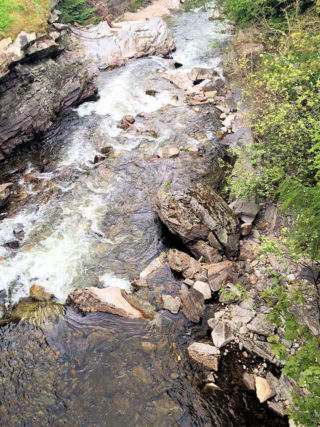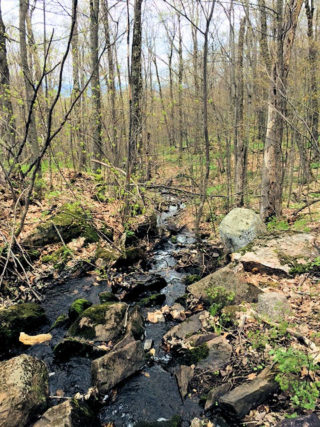All morning she and her brother had been begging to be allowed out but the childminder would only let them play in the garden. She said they were too young to go wandering around the village. But she was seven and her brother nine and the childminder didn’t know that they had often gone wandering.
They didn’t want to play in the garden. There was nothing to discover there, and they kept getting into trouble when their football landed in a flower bed.
So they stayed indoors and read comics until they got hungry and were called to lunch.
After lunch they waited until the child-minder lay down on the couch and fell asleep. Then her brother suggested they head towards the mouth of the river.
The river was out of bounds. The mouth of the river must be far, she thought. It sounded like a great adventure.
“How far is it?” she asked.
“It’s not that far, I only went once, I couldn’t say exactly, but we just follow the river.”
The river ran through the village, under a bridge, through fields then down into the lake. The water was brown and smelled of turf. Looking over the bridge you could see it flow over rocks and disappear around a bend. Beyond the bend was unknown territory to her, an area known as the warren. She’d heard that the warren was full of rabbits, entire fields of rabbit holes. She thought her brother knew his way through the warren; boys in their school sometimes boasted that they went there with their shotguns to hunt rabbits and other animals.

They started off down a muddy lane, with the riverbank to their left. The lane had high hedges on either side and smelled of cow dung. They had to pick their steps between huge cow-pats on the ground and soon left the laneway and followed the river through a field. It was less mucky but the grass was wet from heavy falls of rain all week. Their shoes were soon drenched. Her feet were frozen. Her socks wouldn’t dry before they got home, but she didn’t say anything. She didn’t want to bother her brother with such details. She’d just take them off and say she’d lost them.
As they walked, keeping close to the riverbank, they finally left the field behind and walked along the water’s edge. She saw schools of tiny fish in pools between rocks. And a water rat scampered along the edge in front of them, frightened from its burrow.
They were on their way to a forbidden place, to the mouth of the river, where it stopped being a river and became part of a lake. She was scared but didn’t want to tell her brother.
At times they had to crawl under overhanging tree branches. Where the water was high and there was no riverbank to walk on, they simply waded into the water, or climbed from rock to rock to try and stay dry. Her brother led the way, she stayed close behind him.
Soon they rounded the bend, out of sight from the bridge. Here the current was stronger and the water deeper and darker. It formed a brownish foam as it ran over the rocks and the weeds that grew on its banks. Then it rushed downwards to a pool. They ran down a hill, keeping pace with the river, and came to a marshy wetland, no more trees or bushes just a wide, open space. Coming out from the narrow riverbank, it was strange to be able to see clear sky.
Here, the ground was soft and their feet sank easily. Their shoes, full of mud and bits of duckweed, squelched as they walked.
A cottage stood above the riverbank. Smoke was coming from a chimney but there was no sign of anyone, not a soul. Walking as quietly as they could past the cottage, she looked up and saw an old man come out the cottage door, accompanied by a big dog.
“Hey, you!” he called, waving a stick at them. “What are you doing? Get out of here before I set the dog on you!”
The dog growled as if in warning.
There was no place to hide so they walked on, faster and faster, still following the river. Soon the cottage and the old man were in the distance behind them.

“How much further to the mouth of the river?” she asked as soon as she got her breath back.
Her brother didn’t answer.
She wanted to turn back but that would mean they would have to go past the cottage and the old man again. Her brother slowed down so that she caught up with him. They were now walking side by side.
“How much further?” she asked again.
Again, no answer came. Then he turned to her and whispered, “It might be a bit further than I thought.”
She saw that he had turned pale and his voice was different.
“Let’s go home,” she said.
“We can’t, we have to keep going. We said we’d go to the mouth of the river. We can’t turn back now.”
They walked on.
A dead animal lay across the grassy pathway before them, blood and guts oozing from its body, its eyes glazed and wide open. Her brother swore. She jumped backwards.
“Oh my God!” she shouted. “What’s that?”
“It’s a fox,” he answered.
“Are you sure? How do you know it’s a fox?”
“It’s got a long, pointed nose and a furry tail. Look.” He kicked the animal’s head. A swarm of flies came buzzing out of its mouth.
She thought of the fox fur her grandmother used to wear to keep her shoulders warm. This fox was wet and dead, its fur dirty and sleeked with mud and rain.
“It must have got shot, it probably died from bullet wounds,” he said. Then he added, “We should go back now,” and turned around abruptly.
They had to walk past the old man’s house again. This time there was no sign of him but the dog was still there.
She knew that her brother was scared. She tried to take his hand in hers but he pulled it away roughly. As they walked past the house, she grabbed his arm. He let her hold onto him.
They headed back the way they had come, along the riverbank. Soon the pathway was too narrow for them to walk side by side. Her brother took the lead without a word.
As soon as they were within sight of the bridge, they stopped walking and sat on the rocks by the river to try and dry their shoes and to wipe away the traces of grass and muck from their clothes. Her socks were dripping wet; she stuffed them into her pocket.
“Did you get a fright when you saw the dead fox?” he asked her.
She thought for a moment and finally said, “Yeah, I got a fright. Did you?”
“Me? No, dead animals don’t scare me.”
Only live ones, she thought, but she said nothing.
They stayed sitting there for a few minutes, then continued along the riverbank and up to the road home, through the village.
As they walked over the bridge they stopped and looked down at the river.
She imagined it flowing on over rocks and weeds, past the wet, marshy warren, past the old man’s cottage and the dead fox, and on, finally, to the unseen place where it was no longer a river but part of a lake.
© 2022, Niamh Tixier

Really an excellent piece. I felt pulled right into Niamh’s childhood with all its delicious and disturbing detail.